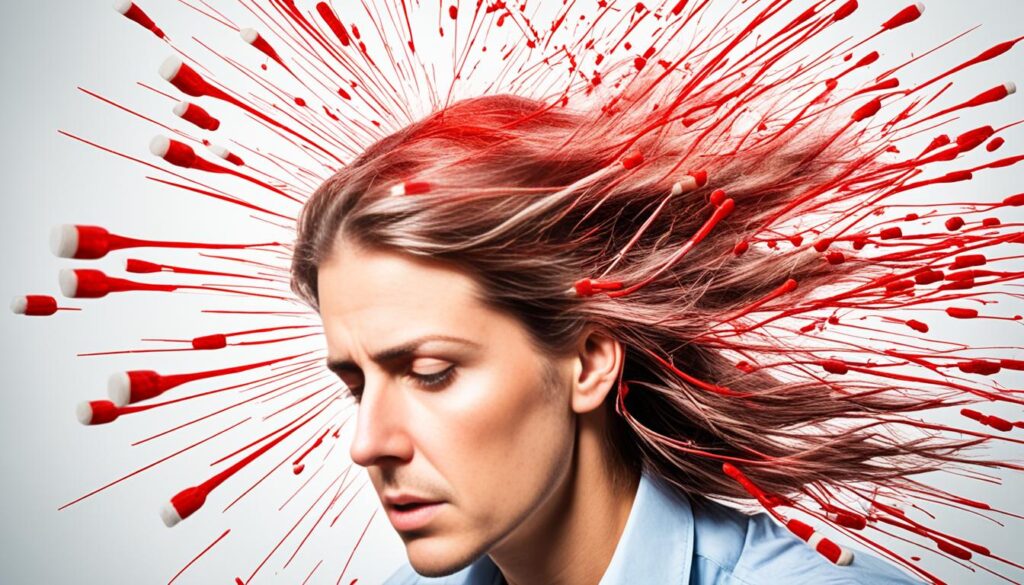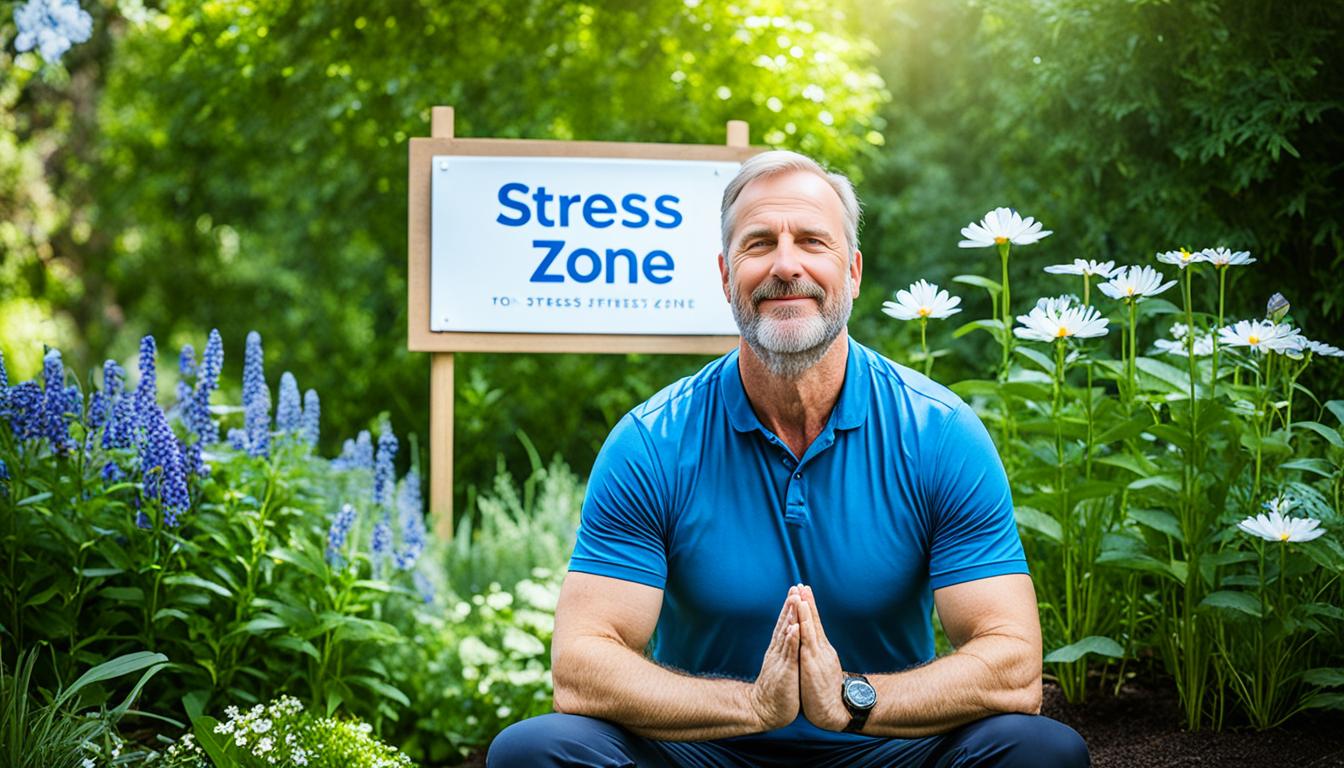Stress-induced hair loss can be a distressing problem that affects many individuals. The good news is that there are effective coping strategies available to help combat this issue and promote hair regrowth. By implementing stress management techniques and adopting healthy habits, you can reduce stress levels and prevent further hair loss. In this article, we will explore some proven coping strategies for stress-induced baldness.
Key Takeaways:
- Stress-induced hair loss can be managed through the implementation of stress management techniques.
- Reducing stress levels through relaxation techniques, exercise, and maintaining a healthy diet is crucial for promoting hair regrowth.
- Nutrition and topical treatments play a significant role in supporting healthy hair growth.
- Consulting a dermatologist or hair loss specialist can help identify the underlying cause and develop a tailored treatment plan.
- Restoring confidence and regaining lost hair require time, dedication, and a comprehensive approach.
Understanding Stress-Related Hair Loss
Stress-related hair loss can be attributable to various factors, including telogen effluvium, alopecia areata, and trichotillomania.
Telogen effluvium is the most common cause of stress-related hair loss. It occurs when the hair growth cycle is disrupted by physiological stressors. Major illnesses, surgeries, accidents, or even childbirth can contribute to hair thinning.
Alopecia areata is an autoimmune disorder in which the immune system mistakenly attacks the hair follicles. This results in patchy hair loss, which can be triggered or exacerbated by stress.
Trichotillomania is a hair-pulling disorder that often arises from underlying stress or psychological factors. Individuals with trichotillomania have an impulse to pull out their hair, leading to noticeable hair loss and thinning.
It is crucial to consult a dermatologist or hair loss specialist to accurately diagnose the underlying cause of stress-related hair loss and develop an appropriate treatment plan.

| Cause of Hair Loss | Description |
|---|---|
| Telogen Effluvium | Disruption of hair growth cycle due to physiological stress, resulting in hair thinning. |
| Alopecia Areata | Autoimmune disorder causing the immune system to attack hair follicles, leading to patchy hair loss. |
| Trichotillomania | Hair-pulling disorder resulting in significant hair loss and thinning. |
Strategies for Reducing Stress
Reducing stress is crucial for promoting hair regrowth. When stress levels are high, it can disrupt the hair growth cycle and contribute to hair thinning and loss. By incorporating relaxation techniques, maintaining a healthy diet, engaging in regular exercise, and achieving work-life balance, you can effectively minimize stress and support hair health. Let’s explore some strategies that can help you reduce stress and promote hair regrowth.
Relaxation Techniques
Relaxation techniques such as meditation, deep breathing exercises, and mindfulness can help manage stress and develop coping mechanisms. These practices promote a sense of calmness and relaxation, allowing your body to release tension and reduce stress levels. Consider incorporating these techniques into your daily routine to help combat stress-induced hair loss.
Healthy Diet
A healthy diet plays a crucial role in reducing stress and supporting overall well-being. Incorporate foods that are rich in vitamins, minerals, and antioxidants, as they can help regulate your mood and reduce stress levels. Foods such as leafy greens, fatty fish, nuts, and seeds can provide essential nutrients that support hair health and reduce the impact of stress on your body.
Exercise
Regular exercise not only improves your physical health but also has significant benefits for your mental well-being. Engaging in activities such as jogging, yoga, or cycling can help increase blood flow to the scalp, promoting hair growth. Additionally, exercise triggers the release of endorphins, which are known as “feel-good” hormones that help reduce stress and improve your mood.
Work-Life Balance
Maintaining a healthy work-life balance is essential for managing stress levels. Establishing clear boundaries between work and personal life can help prevent burnout and reduce stress. Prioritize self-care activities, spend quality time with loved ones, and make time for hobbies and relaxation to achieve a better work-life balance.

Nutrition and Topical Treatments for Hair Regrowth
Proper nutrition plays a crucial role in promoting healthy hair growth. To nourish your hair from within, it’s important to incorporate foods that are rich in key nutrients. Foods high in protein, such as lean meats, fish, and beans, provide the building blocks for strong and healthy hair. Iron-rich foods like spinach, lentils, and red meat help maintain proper blood flow to the hair follicles, promoting growth. Omega-3 fatty acids found in fatty fish like salmon and sardines can help strengthen hair follicles and reduce inflammation in the scalp.
In addition to a nutritious diet, supplements can also be beneficial for hair regrowth. Biotin, often referred to as “the hair vitamin,” can help strengthen the hair shaft and promote healthy growth. Zinc is another important nutrient that supports hair growth and helps prevent hair loss. Vitamin D deficiency has been linked to hair thinning, so it’s important to ensure you’re getting enough through either sun exposure or supplementation.
When it comes to topical treatments, minoxidil is a popular option that has been shown to stimulate hair regrowth. It works by increasing blood flow to the hair follicles and prolonging the growth phase of the hair cycle. Natural oils such as coconut oil, argan oil, and castor oil can also be used topically to nourish the scalp, reduce inflammation, and promote hair growth. Regular scalp care, including gentle massage and exfoliation, can help improve blood circulation and create a healthy environment for hair regrowth.
Essential Nutrients for Hair Growth
| Nutrient | Sources |
|---|---|
| Protein | Lean meats, fish, beans |
| Iron | Spinach, lentils, red meat |
| Omega-3 Fatty Acids | Fatty fish (salmon, sardines) |
| Biotin | Eggs, nuts, sweet potatoes |
| Zinc | Oysters, pumpkin seeds, beef |
| Vitamin D | Sun exposure, fortified foods, supplements |
Conclusion
Coping with stress-induced hair loss requires a comprehensive approach. By identifying the underlying cause of hair loss, whether it’s telogen effluvium, alopecia areata, or trichotillomania, you can tailor your treatment plan accordingly.
Reducing stress levels is crucial for promoting hair regrowth. Incorporating relaxation techniques like meditation, therapy, and engaging in regular exercise can help manage stress and develop coping mechanisms. Maintaining a balanced diet, getting enough sleep, and achieving a healthy work-life balance are also vital for reducing stress levels and supporting hair regrowth.
In addition to stress management, nourishing your hair with essential nutrients can make a significant difference. Include foods rich in protein, iron, and omega-3 fatty acids in your diet. You may also consider supplements like biotin, zinc, and vitamin D to support hair growth. Utilizing topical treatments such as minoxidil and natural oils, as well as practicing regular scalp care and massage, can further stimulate hair growth and improve scalp health.
Remember, regaining lost hair and restoring confidence is a journey that requires patience and commitment. By implementing these coping mechanisms and strategies, you can create a solid foundation for regrowth. Stay consistent, practice self-care, and consult with a dermatologist or hair loss specialist for personalized guidance. With time, dedication, and the right strategies in place, you can achieve the desired results and regain your confidence.
FAQ
What causes stress-induced hair loss?
Stress-induced hair loss can be caused by factors such as telogen effluvium, alopecia areata, and trichotillomania.
How can I reduce stress levels?
There are several strategies you can utilize to reduce stress levels, including relaxation techniques, exercise, maintaining a healthy diet, and achieving work-life balance.
What role does nutrition play in promoting hair regrowth?
Proper nutrition, including foods rich in protein, iron, and omega-3 fatty acids, is essential for healthy hair growth.
Are there any supplements or topical treatments that can help with hair regrowth?
Yes, supplements like biotin, zinc, and vitamin D, as well as topical treatments like minoxidil and natural oils, can support hair growth.
How long does it take to regrow hair lost due to stress?
The journey to regaining lost hair takes time and dedication. Consistently implementing coping mechanisms, nourishing your hair, and incorporating topical treatments and scalp care can lead to desired results.

